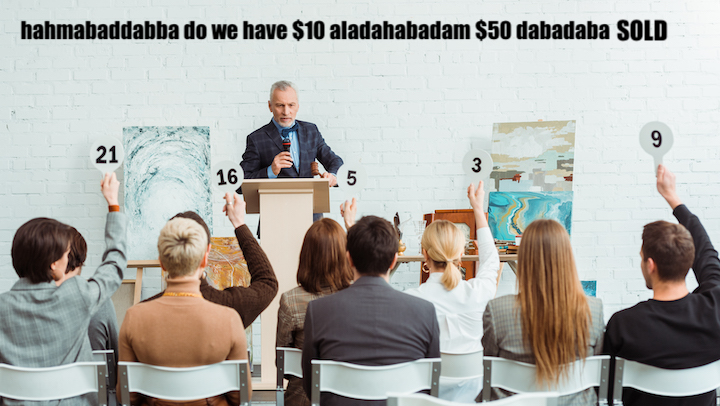Google ads auction works by advertisers bidding for ad placement and paying when their ad is clicked. This auction is based on factors such as bid amount, ad quality score, and ad relevance.
As a content writer, it is important to understand how this auction system works, as it affects the success of your clients’ advertising campaigns. When creating content for google ads, you must keep in mind that your content will only be successful if it is tailored to relevant, high-quality keywords and has a high quality score.
The ad’s relevance to the user’s search query is also a significant factor in determining how successful your content will be. Ultimately, the success of your google ads campaign is dependent on a variety of elements that must be considered together. As a seo-friendly content writer, it is essential to be knowledgeable about the google ads auction system to develop effective, optimized content.

Credit: insight.kellogg.northwestern.edu
Understanding Google Ads Auction
Google ads auction is a process where various advertisers bid to place their ads on google search results pages, youtube, and other websites. The auction allows google to select which ads will appear and in what order, providing users with the most relevant and useful ads.
Let’s take a deeper look at the basics of the auction process.
Basic Principles Of The Auction
The auction process consists of three basic principles:
- Relevance: To ensure that the search results provide the best possible user experience, ads must be relevant to the user’s search queries.
- Ad rank: Advertisers are ranked based on their ad’s relevance, the amount they’re willing to pay per click, and their ad’s quality score.
- Costs: Advertisers only pay for clicks on their ads, not for the ad space itself. The cost per click is determined by the amount the advertiser is willing to pay per click and their ad’s relevance.
How Bids Affect Ad Ranking
Bids play a crucial role in ad ranking. Advertisers who bid the highest price for clicks are not necessarily guaranteed the top ad position. Ad rank, which is calculated using a combination of bid amount, ad relevance, and quality score, determines an ad’s position.
Advertisers with a higher ad rank typically appear higher in the search results.
Quality Score And Its Importance In The Auction
Quality score is a rating system that google uses to determine the relevance and usefulness of an ad. maintaining a high quality score improves ad positioning and enables advertisers to get more clicks for less money. The following factors influence the ad’s quality score:
- Click-through rate (ctr): The frequency at which people click on your ad after seeing it.
- Ad relevance: How closely your ad and keywords match the user’s search queries.
- Landing page experience: The quality and relevancy of the landing page to the user’s search queries.
Understanding google ads auction is essential for advertisers looking to maximize their advertising efforts. By adhering to the basics of ad ranking, the impact of bids, and prioritizing quality score, advertisers can improve ad positioning and attract more clicks towards their ads.
Preparing For The Auction
Setting Up A Google Ads Account
Before you can participate in the auction, you need to set up a google ads account. This process is free, but you’ll need a gmail account to get started. The following steps will help you to create a google ads account:
- Visit the google ads website and click the ‘start now’ button.
- Enter your email address and website url.
- Choose your target audience and location.
- Decide on a daily budget.
Keyword Research
Next, you need to conduct keyword research to find out which keywords your potential customers are using to find your products or services. Keyword research will help you to understand your audience and their search intent. Here are some steps to perform keyword research:
- Use google’s keyword planner to find popular and relevant keywords.
- Look for long-tail keywords with low competition that can drive targeted traffic to your website.
- Use tools like ahrefs, semrush, or moz to perform in-depth keyword analysis.
Ad Creation
Once you’ve identified your keywords, it’s time to create high-quality ads that will grab users’ attention and drive traffic to your website. You should consider the following when creating your ads:
- Use a catchy headline that speaks directly to your target audience.
- Write a compelling description that highlights the benefits of your product or service.
- Use relevant keywords in your ad to attract users who are looking for what you offer.
- Include a clear call-to-action (cta) that encourages users to click on your ad.
Budget Setting
Google ads gives you complete control over your advertising budget. You can set a daily budget for your campaigns and adjust it as needed:
- Determine how much you’re willing to spend on each click or impression.
- Specify the maximum amount you want to spend each day.
- Set your budget based on your business goals and objectives.
Selecting Bid Strategies
Finally, you need to decide on the bid strategies you’ll use for each of your keywords. There are several options to choose from:
- Cost per click (cpc) bids: You only pay when a user clicks on your ad.
- Cost per impression (cpm) bids: You pay for every thousand impressions your ad receives.
- Cost per acquisition (cpa) bids: You pay when a user takes a specific action on your website.
By selecting the right bidding strategy, you can maximize your chances of winning the auction and drive more traffic to your website.
Participating In The Auction
When you decide to start a google ads campaign, participating in the auction is an essential part of the process. Here are the key points you should be aware of when participating in the auction:
Ad Placement And Targeting Options
- When participating in the auction, you need to choose the ad placement and targeting options. Ad placements are the locations on google’s network where your ads can appear, and targeting options are the criteria through which you select your audience.
- Ad placement options include the search network, which displays ads when users search for specific keywords, and the display network, which displays ads on various websites, apps, and videos throughout the internet.
- Targeting options include geographical location, age, gender, language, device type, and many more. By selecting your target audience, you can ensure that your ads are shown to the right people at the right time, which is crucial for maximizing your roi.
Ad Rank Calculation
- The ad rank is google’s way of determining your ad’s position on the search results page or other ad placement options. Ad rank is calculated based on your bid amount, ad quality score, and various other factors like the user’s search query, device type, and ad format.
- The bid amount is the maximum amount you are willing to pay for a click on your ad. The ad quality score is a rating out of ten based on the quality of your ad, the relevance of your ad to the user’s search query, and the user’s experience while interacting with your website or landing page.
- The higher your ad rank, the higher the chances of your ad appearing in a prominent position on the search results page or other ad placement options.
Display Network Vs Search Network Auction
- The display network auction differs from the search network auction. When participating in the display network auction, you bid for ad placements on various websites, while in the search network auction, you bid for ad placements on search results pages.
- The display network auction allows for different ad formats, such as image ads and video ads.
- The search network auction is more focused on text-based ads that appear on the top or bottom of the search results page.
Participating in the google ads auction requires understanding of ad placement and targeting options, ad rank calculation, and the differences between the search and display network auctions. By considering each of these factors carefully, you can effectively promote your business and achieve your roi goals.
Winning The Auction
Insights On Winning Bids
Winning a google ads auction requires a few factors that determine the outcome. Understanding the auction dynamics can be a valuable strategy to win the bids. Here are some insights that you can use to increase your chances of winning the auction:
- Bid amount: Setting a bid amount for each keyword is the critical factor that determines whether or not your ad wins the auction. To increase your chances of winning, ensure that your bid amount is competitive for the target keywords that you are bidding on.
- Ad quality: Google considers ad relevance, landing page experience, and expected click-through rate (ctr) to rank ads in the auctions. Ensure that your ad relevance and landing page experience are top-notch to help you win the auction.
- Ad extensions: Ad extensions increase the relevance of your ads by providing valuable information to potential customers. Google rewards ads with extensions with a higher ad rank, increasing the chances of winning the auction.
- Ad scheduling: Timing can be crucial in winning the auction. Consider scheduling your ads to run during peak hours when there is a higher chance of attracting traffic.
Actual Cost Of Ads
The actual cost per click (cpc) in a google ads auction is based on various factors. The auction process and how google charges for ad clicks determine the actual cost of an ad. Here are some factors that impact the actual cost of ads:
- Ad rank: Your ad rank determines the actual cost of the ad. If your ad ranks in the top position, you may be charged less for clicks than if your ad was in a lower position.
- Ad quality: If your ad quality score is high, google may charge you less for clicks than if your score is lower. This is because higher-quality ads are more relevant to users.
- Competitive bidding: If there are many advertisers competing on the same keyword, the actual cost per click may be higher. The higher the competition, the higher the actual cost per click.
Ad Position And Impact On Performance
Ad position can impact the performance of ads in google ads auctions. Here are some ways ad position can affect performance:
- Visibility: Ads that appear in higher positions are more visible to users, increasing the chances of clicks and conversions.
- Cost per click: Generally, ads in higher positions have a higher cost per click (cpc) than ads in lower positions. However, higher ad positions also tend to have a better click-through rate (ctr), which can help offset the higher cpc.
- Aggressive bidding: Aggressive bidding for the first position can increase the overall cost of campaigns while providing the advantage of having the best visibility.
Ad Relevance, Landing Page Experience, And Expected Ctr
Ad relevance, landing page experience, and expected click-through rate (ctr) are essential factors in the auction process. To maximize your chances of winning the auction, it is crucial to make sure that your ad relevance, landing page experience, and expected ctr are top-notch.
Here are some tips to improve these factors:
- Ad relevance: Ensure that your ads are tightly themed around the keywords you are targeting and focus on crafting ad copy that is relevant to the user’s search query.
- Landing page experience: Focus on landing page design, loading time, and provide the user with relevant information to improve the landing page experience.
- Expected ctr: To improve your expected ctr, focus on creating high-quality ad copy that resonates with the users’ search intent and provides relevant information. Utilize ad extensions to enhance visibility and capture user’s attention.
Maximizing The Auction Results
Google ads auction is a highly competitive marketplace. For advertisers, it’s essential to maximize auction results to achieve business goals successfully. Here are effective ways to optimize your auction results and make the most of your advertising budget:
Tools For Monitoring And Optimizing Ads
To optimize your ads for a higher auction rank, you need to keep an eye on ad performance. The following tools can help you monitor and optimize your ads:
- Google ads dashboard: It gives you a clear overview of ad performance, including clicks, impressions, and conversions. You can also adjust your bidding strategy, add or remove keywords, and adjust your budget.
- Google analytics: It provides insights into user behaviors, such as page views, bounce rates, and user locations. You can use this data to refine your targeting and optimize your ads for better performance.
- Ad preview and diagnosis: It allows you to see how your ads appear in search results and provides diagnostics to help identify potential issues.
A/B Testing Ad Variations
A/b testing is the process of comparing two ad variations to determine which one performs better. Here’s how you can carry out a/b testing:
- Identify the ad elements you want to test, such as headlines, descriptions, or images.
- Create two or more variations of the ad with different elements.
- Run the ads simultaneously and measure their performance.
- Analyze the data and determine the winner based on key metrics like click-through rate (ctr), conversion rate, and cost per conversion.
Leveraging Competitor Information
Your competitors can provide valuable insights into the market landscape, their bidding strategies, and ad creatives. Here are some ways to leverage competitor information to improve your auction results:
- Research competitor keywords and ad creatives using tools like google keyword planner, google ads auction insights, and spyfu.
- Analyze competitor landing pages and identify the elements that make them effective.
- Use insights to refine your ad targeting, messaging, and creative elements.
Re-Evaluating And Refining Strategies
Optimizing your auction results is an ongoing process. Re-evaluate your strategies regularly, refine them based on data-driven insights, and keep testing new approaches. Here are some tips for refining your strategies:
- Analyze ad performance data regularly and adjust your ads and bids accordingly.
- Keep track of changing market trends and adjust your targeting and messaging to stay relevant.
- Test different ad formats and creative elements to identify the ones that work best for your audience.
By following these optimization techniques, you can maximize your google ads auction results and achieve your advertising goals more effectively. Keep experimenting and refining your strategies to stay ahead of the competition.
Frequently Asked Questions Of How Google Ads Auction Works
How Does Google Ads Auction Work?
Google ads auction is a process of determining which ads will appear on google’s search results. Advertisers bid on specific keywords, and google ranks the ads based on ad quality and maximum bid amount. The highest-ranked ads appear at the top of the search results page.
How Do Advertisers Participate In The Google Ads Auction?
Advertisers participate in the google ads auction by setting up a google ads account and creating ad campaigns. They choose keywords, set a bid amount, and create ad copy. Once the ads are approved, they start running and participate in auctions based on the keywords they target.
How Does Google Determine The Ad Ranking In The Auction?
Google determines ad ranking based on two factors: ad quality and maximum bid amount. Ad quality takes into account factors such as relevance, landing page experience, and ad format. Advertisers with higher-quality ads have an advantage in the auction, even if their bid amount is lower than others.
How Does The Bidding Process Work In The Google Ads Auction?
In the google ads auction, advertisers bid on specific keywords and set a maximum bid amount. Advertisers only pay when someone clicks on their ad. When a search is made, the auction is triggered, and google determines which ads to show based on bid amount, quality score, and other factors.
How Does Ad Quality Affect The Google Ads Auction?
Ad quality is one of the key factors in determining ad ranking in the google ads auction. Google uses signals like click-through rates, user behavior, keyword relevance, and landing page experience to determine ad quality. Higher-quality ads have a better chance of appearing in top positions, even with lower bid amounts.
Why Is Google Ads Auction Important For Advertisers?
Google ads auction is important for advertisers because it enables them to reach a large audience, target specific keywords, control advertising spend, and measure ad performance. The auction also ensures that the most relevant and high-quality ads appear to users, resulting in a better user experience.
Conclusion
Understanding how google ads auction works is crucial for businesses who want to make the most out of their advertising efforts. The auction system is complex but it presents a fair playing field for all advertisers. Keep in mind that the outcome of the auction primarily depends on the relevance and quality of your ad campaign.
Quality score, bid amount, and ad rank are significant factors that can make or break your chances of winning in the auction. As a business owner or marketer, it is important to keep yourself updated with the latest trends and developments in the world of online advertising.
By doing so, you can constantly improve your ad campaigns and increase the chances of winning in the auction. Remember that with careful planning, effective strategy, and continuous optimization, achieving your desired results in google ads is not only possible but also feasible.




